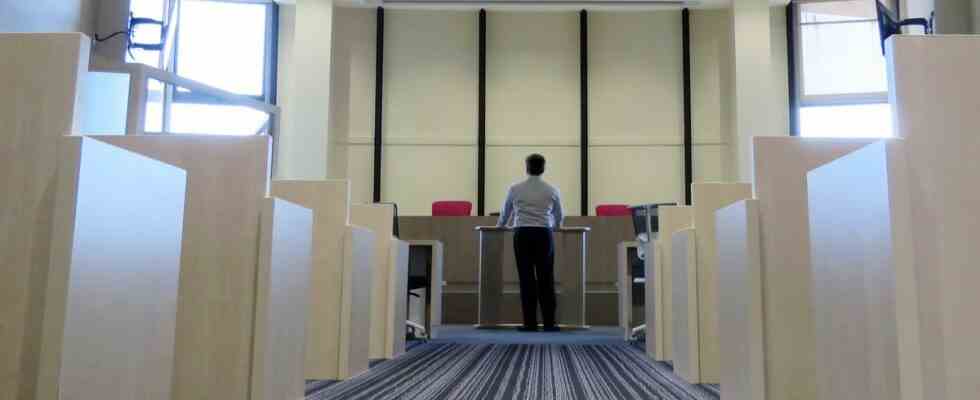She is constantly criticized for her slowness. Like a snail that would like to get rid of its shell to move forward faster, French justice is desperately trying to empty its cupboards filled with more or less complex files. The problem is that it is sorely lacking in manpower to carry out its missions. Head under water, its staff do what they can to make “fair” decisions within what we will describe as “appropriate” deadlines. In an attempt to gain in efficiency, the Chancellery drew inspiration from the model of “plead-guilty” in force in the United States to launch appearance on prior admission of guilt or CRPC. Proposed since 2004 in the first instance, the procedure supposed to be “accelerated” is now open to the courts of appeal.
In Rennes, the first CRPC appeal hearing was held discreetly on January 18 under the watchful eye of Maxime Tessier. The Rennes lawyer will forever be the first to have experienced the procedure before the Rennes Court of Appeal, which has jurisdiction over the five departments of historic Brittany. “My client had received a suspended prison sentence for non-payment of child support. He had appealed and paid all the pensions. He recognized the facts but since then he has been waiting. Five years later, the man was the first to experience the CRPC on appeal. “We completed the file in thirty minutes. My client saved time, the judge too, me too and the registry will have less work. Everyone comes out a winner,” says the lawyer, author of Defense in CRPC published in 2020.
“We’re not going to do dozens of CRPCs all at once, but we’re still hoping for significant gains in terms of speed. For us, it is a good way to evacuate old files, ”said the president of the court of appeal Frédéric Benet-Chamberlan. This enthusiasm, we wanted to confront reality, by going to the criminal court for a day of “plead-guilty” in the first instance. An excellent way to see that the CRPC is far from solving all the snail’s ills.
Filthy image and computer that does not work
Let’s first explain how the procedure works. When a defendant admits his offence, the prosecutor can choose to direct him to a court appearance on prior admission of guilt. The audience then arrives very quickly. The prosecutor will first propose a sentence during a closed-door negotiation with the defendant and his lawyer. Then it will be up to a judge to approve the sentence in the process, during a hearing which lasts only about ten minutes. This Friday, about twenty hearings are scheduled. But from the second, the machine seizes up. Faced with a computer problem, the clerk cannot activate the software validating the sentence. The magistrate who sits, already not a fan of the CRPC, must chat with a detainee by videoconference. The image is filthy and you can barely make out the prisoner, who absolutely must sign a document before being able to dispose of it. In the end, it will take more than an hour fifteen to judge a case that should have taken only ten minutes! “We are supposed to get more defendants through on a morning, but we are wasting a lot of time because the computer is not working,” laments the clerk.
At his side, the judge does not take off. “For me, it’s at least two days of work: one day to prepare, one day to sit. And as much time as I don’t spend on my files. We don’t have the means, the software never works, so we’re wasting our time. It’s DIY. We repair justice with sticking plaster that does not stick, ”regrets the judge. A defendant is annoyed to be there for three hours without being able to be judged, the interpreters are impatient. The other problem with the CRPC is that it can also take years, if a referral is requested. “The sentence then no longer has any meaning for anyone,” tackles the judge.
A “softer” side for the defendants
Outside the courtroom, the lawyers are no more excited. With this big computer glitch, they too have to hang around. No other choice, because in CRPC, their presence is mandatory. The advantage? They can negotiate with the prosecutor. “It takes us time when the procedure is supposed to be fast. But I see a lot of positive aspects in it, ”says Me Célina Dolivet. The Rennes lawyer evokes a “softer” side for the defendants. “The CRPC is often offered to people whom justice is not likely to see again, people who recognize their actions and who should not reoffend. By passing through a closed office and then in front of a judge who only has to validate, litigants are generally less impressed. “There is not the same solemnity. “His colleague Me Alice Poitevin shares the observation. “The CRPC is like a favor for people who don’t have too many criminal records. There is a less intimidating side, it’s like a contract with justice. »
This negotiation with the prosecutor is also an opportunity for a more peaceful discussion between the defendant and the magistrate. “It’s a real opportunity to work on the pain, to discuss. For some litigants, it is also a way for it to stop immediately. Justice should not be rushed. But if everyone thinks the decision is right, why not adopt it? asks Me Maxime Tessier. For now, the number of appeal proceedings remains very low. But the courts could quickly seize it to settle old files. In Rennes, there are still cases judged in 2017 which have still not been re-examined on appeal.

